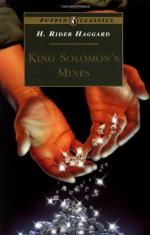After this we travelled on without any further misadventure till about one o’clock, when we called a halt, and having drunk a little water, not much, for water was precious, and rested for half an hour, we started again.
On, on we went, till at last the east began to blush like the cheek of a girl. Then there came faint rays of primrose light, that changed presently to golden bars, through which the dawn glided out across the desert. The stars grew pale and paler still, till at last they vanished; the golden moon waxed wan, and her mountain ridges stood out against her sickly face like the bones on the cheek of a dying man. Then came spear upon spear of light flashing far away across the boundless wilderness, piercing and firing the veils of mist, till the desert was draped in a tremulous golden glow, and it was day.
Still we did not halt, though by this time we should have been glad enough to do so, for we knew that when once the sun was fully up it would be almost impossible for us to travel. At length, about an hour later, we spied a little pile of boulders rising out of the plain, and to this we dragged ourselves. As luck would have it, here we found an overhanging slab of rock carpeted beneath with smooth sand, which afforded a most grateful shelter from the heat. Underneath this we crept, and each of us having drunk some water and eaten a bit of biltong, we lay down and soon were sound asleep.
It was three o’clock in the afternoon before we woke, to find our bearers preparing to return. They had seen enough of the desert already, and no number of knives would have tempted them to come a step farther. So we took a hearty drink, and having emptied our water-bottles, filled them up again from the gourds that they had brought with them, and then watched them depart on their twenty miles’ tramp home.
At half-past four we also started. It was lonely and desolate work, for with the exception of a few ostriches there was not a single living creature to be seen on all the vast expanse of sandy plain. Evidently it was too dry for game, and with the exception of a deadly-looking cobra or two we saw no reptiles. One insect, however, we found abundant, and that was the common or house fly. There they came, “not as single spies, but in battalions,” as I think the Old Testament[*] says somewhere. He is an extraordinary insect is the house fly. Go where you will you find him, and so it must have been always. I have seen him enclosed in amber, which is, I was told, quite half a million years old, looking exactly like his descendant of to-day, and I have little doubt but that when the last man lies dying on the earth he will be buzzing round—if this event happens to occur in summer— watching for an opportunity to settle on his nose.
[*] Readers must beware of accepting Mr. Quatermain’s
references as
accurate, as, it has been
found, some are prone to do. Although
his reading evidently was
limited, the impression produced by it
upon his mind was mixed.
Thus to him the Old Testament and
Shakespeare were interchangeable
authorities.—Editor.




